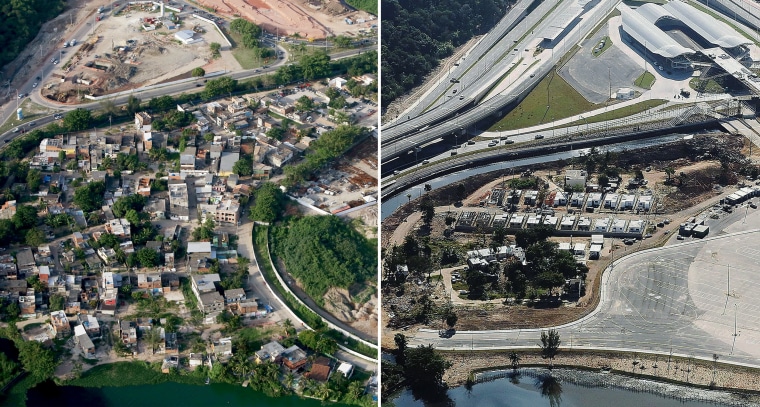RIO DE JANEIRO — Wedged between a busy highway and the gleaming Olympic Park, a row of 20 whitewashed cinder-block houses border a freshly paved street. This is all that remains of Vila Autodromo, a once vibrant working-class community that was home to around 700 families.
One of these new houses built by the city of Rio belongs to 51-year-old Maria da Penha Macena, a small-framed lady with seemingly boundless energy. Da Penha is a survivor — one of a handful of residents who fought city officials, through activism and legal action, to remain on the land.
For years, the favela — an illegally settled shantytown common throughout Brazil — experienced little outside pressure. But as Rio’s population expanded, Vila Autodromo was slowly surrounded by luxury condominiums built for the upper- and middle-class area of Barra de Tijuca — and favela residents felt the squeeze.
Related: Five Things to Know About Rio's So-Called Shantytowns
They faced resettlement for the first time in 1993 when the city began to request the removal of homes in the area, citing legislation to protect the environment even though the state of Rio had conceded the use of land by residents in 1990. In 1998, residents were granted a 99-year period of ownership of the land.
Then when Rio was chosen in 2009 to host the Olympics, city officials announced that thousands of families, including those in Vila Autódromo, would be expelled to accommodate the massive sporting event.
“This community has been threatened with removal for 26 years, and with the arrival of the Olympics, this threat materialized,” Da Penha said
City officials argued that the community was illegally occupying land that belonged to the city of Rio, not the state.
“[The city of Rio] slowly, persistently intimidated, pressured, and made offers to residents (a combination of those three in all cases) until one after the other families left,” explained Rio on Watch Editor Theresa Williamson.

A municipal secretary for the city of Rio told NBC News that, in 2013, they met with all the families who were located on the land to negotiate resettlement.
“The people from Vila Autodromo were treated from the very beginning with all the respect and consideration of negotiation,” said Jorge Arreaes, a municipal secretary for the city of Rio.
In the 1960s, Vila Autodromo was a thriving fishing village on the shores of the Jacarepaguá Lagoon. It was named after a nearby racetrack, which has now been transformed into the Olympic Park, the heart of the Rio 2016 Games.
PHOTOS: 'Favela Brass' Music School Prepares for 2016 Rio Games
This week, as the Games opened to fanfare in Rio, Da Penha and her husband — along with 19 other holdout families — moved into their small, boxy houses built by the city of Rio on the property where hundreds of their neighbors once lived.
The slogan “Not everyone has a price” was visible on some of free-standing walls of demolished buildings. It’s Da Penha’s slogan, and to her neighbors, she’s a real-life hero, having led the resistance to the government’s plans.
Officials offered residents either money or public housing to clear out. But not everyone took the offer; and those who stayed behind watched helplessly as heavy equipment rolled in and demolished their homes.
“It was a terrible moment. It was very painful. You see all your history on the ground,” Da Penha said, although she doesn’t regret battling the city.
“Your right cannot be sold, and cannot be bought,” she said. “Why did I want to stay? Because the government didn’t want to respect my right. And my right was to stay on this land.”

